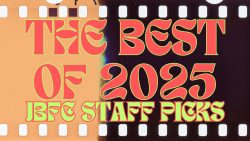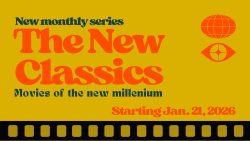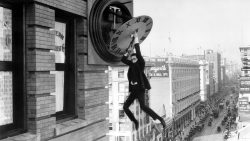Posted September 30, 2019
Judy: Now Showing at the JBFC
by JBFC Programmer Karen Sloe Goodman
Judy is in fact an unusual biopic of the iconic Hollywood star Judy Garland. Produced in the UK, the film had a hugely successful world premiere as the opening night selection the Telluride International Film Festival, where Oscar winner Renée Zellweger had the audience in tears, earned a 3 minute standing ovation, and was presented with a Silver Medallion Award, which are given to filmmakers who have made a significant contribution to the world of cinema. The film’s Director – Rupert Goold – British theater, television and film director, and the artistic director of the Almeida Theatre in London, England. He was awarded the CBE (Commander of the Order of the British Empire) in the 2017 Queen’s New Years Honours List for his services to Drama.
Goold is known primarily as a theater director; he was nominated for a Tony this year for his direction of Ink, a play about the rise of Rupert Murdoch and tabloid journalism. Zellweger gives a stellar performance as the screen legend during the twilight of her career. It’s a remarkable transformation in which she does all her own singing and dancing, and one that has many writers and critics buzzing that she will easily be a front runner for an Oscar. Zellweger was previously nominated for Best Actress in a Leading Role for both Chicago and Bridget Jones’s Diary, and won an Academy Award for Best Supporting Actress in Cold Mountain in 2004.
Additional cast includes the 17-year-old British actress Darci Shaw, who plays the younger Judy, and the versatile Rufus Sewell, portraying her deceptive second husband Sidney Luft, who has appeared in numerous rom-coms, Hollywood epics and costume dramas for more than 25 years, and most recently in two wildly different TV series: portraying a Nazi in Amazon’s The Man in the High Castle, and in Masterpiece PBS’s Victoria as Lord Melbourne, Queen Victoria’s first Prime Minister. The fabulous Jessie Buckley (Wild Rose) is featured as her UK assistant, but unfortunately does no singing here. Finn Wittrock plays her fifth husband Mickey Deans. He’s a Julliard trained actor who has appeared in numerous stage and screen productions, and made an auspicious Broadway debut as Happy in “Death of a Salesman” directed by Mike Nichols!
Renée Zellweger is currently 50 years old, so at the time they shot this film she was almost exactly Garland’s age during this story. Her performance has been touted by many as the best and most courageous role of her life, and I believe that what works here is that she is portraying the star at a moment when she is not at the height of her vocal powers, so that Zellweger wasn’t required to try to match Garland’s legacy of performance greatness. She spent two hours a day in the makeup chair where she was transformed using a combination of prosthetics, contact lenses and wigs, and reportedly also spent a lot of time taking music and choreography lessons in order to emulate Garland’s style and presentation.
Renée Zellweger is set to release her first solo album this month covering songs sung by Judy Garland. Earlier in the month, the 2019 Telluride Film Festival presented one of its Silver Medallion Awards to Zellweger in recognition of the ‘artist’s significant contribution to the world of cinema’ along with a screening of the film Judy. Prior to the film’s release, Liza Minnelli announced through her Facebook account that she had “never met nor spoken to Renée Zellweger” and made it clear that she personally did “not approve nor sanction [this film project] in any way.”
The film script is a loose adaptation of the Olivier-nominated play ‘End of the Rainbow’, a musical drama by Peter Quilter which focuses on Judy Garland in the months leading up to her death in 1969. After a Sydney premiere in 2005, the show has played on the West End in London, and a Broadway production opened in 2012 and earned 4 Tony nominations and won several others for best actress in a new play for English veteran Tracie Bennett. There have been 14 productions mounted worldwide with half a dozen more to come, evidence that interest in Judy Garland has not waned since her death in the late 60’s.Peter Quilter, the playwright, said that he believed screenwriter Tom Edge “wanted the story to be much more true and precise,” with less “elements of fantasy” than the play. The winter of 1968, when this story takes place, was 30 years after Garland played the iconic role of Dorothy in The Wizard Of Oz.
I appreciate that the director didn’t belabor Garland’s demise in the film, and chose to end on a brief moment of triumph, but in reality, there wasn’t much to tell after this chapter, as Garland died of an accidental barbiturate overdose just months after the tour ended in 1969. She was 47 and living alone in a tiny flat in London. This year is the 50th anniversary of Garland’s death, so the filmmakers timed the release accordingly to celebrate the legacy of her work. Notably, many believe that her funeral in New York was the event that precipitated the Stonewall riots which began just afterwards on that weekend in the summer of 1969. Her legacy as a Gay icon is as impactful as her career as a performer.
BIOGRAPHY
Garland was born Frances Ethel Gumm, and became a performer in an act with her two older sisters as a very young child of 3 when she began on the Vaudeville Circuit at her father’s theater She suffered abuse by almost everyone who wanted to exploit her unusual talent. Garland’s parents were Vaudeville performers, and her mother was notorious as a stage mom whom she clearly resented and never felt loved by. She was told that she was an unwanted baby, as she was conceived just before her father was caught in a liaison with a young man and was asked to leave their hometown of Grand Rapids, Minnesota. They moved to California outside of Hollywood, and her relentless mother dragged her to auditions and classes. Garland’s friend revealed to her biographer that Judy suspected her mother of trading sex for favors from producers and studio executives.
Her mother gave Garland amphetamines when she was as young as eight years old to keep her going. Louis B Mayer, who is portrayed as her tormenter in the film, also treated her terribly, called her ‘his little hunchback’, paid her the lowest salary on the lot (with the exception of the terrier who played TOTO in the Wizard of Oz), and made uninvited sexual advances continually. It is widely documented that he was the Harvey Weinstein of his era as co-founder of Metro-Goldwyn-Mayer studios in 1924. According to Gerald Clarke, the author of Garland’s biography “Get Happy: The Life of Judy Garland,” Mayer was ‘the ground zero’ of this kind of abuse, as he had the means and opportunity to force these actresses to comply. He’d threaten to ruin their careers or those of their loved ones, and held meetings with Garland as a teenager seated on his lap with his hands on her chest.
Garland worked under contract at MGM for 10 years, and suffered egregious mistreatment all around. They gave her medication to lose weight and stay 95 lbs., and attempted to orchestrate her social life and dating. During her first marriage to composer David Rose she got pregnant, but the studio didn’t want her to have a baby at that point, so her mother and husband took her without her consent to have an abortion. In 1948, the FBI undertook an investigation of drug abuse in Hollywood, and discovered that Judy’s own doctor was addicted to drugs. In an effort to help her, they told Mayer she had to take a year off for treatment. He claimed it was impossible based on their financial investment in her, and forced Garland back to work after 8 weeks.
Post Hollywood, Garland divorced her second husband Director Vincent Minelli (who was also allegedly gay) and married producer Sidney Luft, who took her away to perform live solo shows around the world. She sold out dozens of shows at The Palladium in London, the Palace Theater in NY and at Carnegie Hall, but she still didn’t have any money while others got wealthy off of her work. She suffered several breakdowns and was told her career was over at 38. Her money and career manager David Begelman, who she subsequently fell in love with, robbed her of all her earnings, and was later convicted on 4 charges of felony grand theft for stealing funds from another client.
Regardless of her painful misuse, she rose like a phoenix. At first reluctant to work on TV, she had a smash TV Special after her award-winning dramatic role in The Judgment at Nurenburg in 1961. Her own show on CBS, “The Judy Garland Show” was a musical variety television series that aired on Sunday nights during the 1963–1964 season for 26 episodes, featuring dozens of guests including Ethel Merman, Barbra Streisand, Mickey Rooney and daughter Liz Minnelli. Unfortunately, it was scheduled up against ‘Bonanza’ and was cancelled, although considered a critical success. She spiraled into further drug and alcohol abuse over the years, and her final shows in NYC were at a Gay bar where she earned a meager $100 for each performance.
PERFORMANCES, INTERVIEWS AND MORE
- JUDY GARLAND – I BELONG TO LONDON 1969: JUDY. LONDON. 1969. A video utilizing Judy’s opening song from the album featuring remarkable video footage of Judy out and about in London in early 1969, as well as rare photos of Judy onstage at the Talk Of The Town where the album was recorded. Garland’s husband, Mickey Deans, and singer Johnnie Ray, can also be seen.
- EVERY JUDY GARLAND FILM in 14 MINUTES: Begins with footage of the Gumm Sisters trio; Hollywood roles and beyond)
- 20/20 Joel Siegel on JUDY GARLAND – 2 part Episode: Posthumous, with Lorna Luft interview, Barbara Walters’ 1967 interview with Garland and her two younger children, excerpts from her unfinished autobiography, interview with her biographer.
- BIOGRAPHY SERIES – 90m. – JUDY GARLAND ‘BEYOND THE RAINBOW: Extensive biography with performance footage, interviews with Judy and numerous Hollywood actors and collaborators, radio broadcasts, Interviews with ex-boyfriends and husbands.
Judy opened Friday, Sept. 27 at the JBFC. Visit our website for showtimes and tickets today.
Want to stay up to date on what’s happening at the JBFC? Make sure to sign up for our ebulletin HERE.



